 I love Cthulhu Wars. So with that in mind, when Tony received Glorantha: The Gods War, he asked me if I wanted to review it. I was not familiar with the title and asked for some more details. He described it as an area control game with similar mechanics to Cthulhu Wars and mentioned that it was a newer Petersen Games title released through Kickstarter. He went on to say that he heard that it might even be a better game than Cthulhu Wars. I chuckled of course and resisted the urge to slap him for such blasphemy.
I love Cthulhu Wars. So with that in mind, when Tony received Glorantha: The Gods War, he asked me if I wanted to review it. I was not familiar with the title and asked for some more details. He described it as an area control game with similar mechanics to Cthulhu Wars and mentioned that it was a newer Petersen Games title released through Kickstarter. He went on to say that he heard that it might even be a better game than Cthulhu Wars. I chuckled of course and resisted the urge to slap him for such blasphemy.
This brings us to today’s review Glorantha: The Gods War from Petersen Games. It’s the end of the universe or the start of a new one and powerful elemental empires are battling to determine the fate of the cosmos. Is Glorantha: The Gods War better than Cthulhu Wars? Read on to find out!
Glorantha: The Gods War (The Gods War) is an asymmetrical, area control, war game for 3-4 players which plays between 90-180 minutes.
Game Overview:
I mentioned in the intro that The Gods War similar mechanics to Cthulhu Wars (review here) and those are combat–rolling dice based on the Units combat value and power use–you spend power to move, attack, & summon units. Beyond that, The Gods War differs significantly and let’s dive into those differences.
Each of the 4 Empires (Sky, Storm, Darkness, & Chaos) in The Gods War (core set) will have unique abilities and a weakness. Each will also have a finite supply of Units and Buildings to place on the map. Every Empire will also have special gifts that will give them bonuses during the game. Lastly, each has 3 Heroquest Fragments (2 parts to each) that are fulfilled through the game (these will grant Empires new powers, gifts and runes). These are like spells in Cthulhu Wars and as they are completed will grant that Empire additional powers and runes.
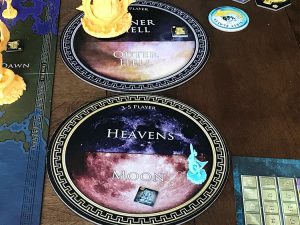
Important things to note about the map board: There is the mainboard or the Surface World, a Sky Dome (above the Surface World), a Hell Sideboard (below the Surface World), and at the beginning of the game there’s the Spike that links the Surface to the Sky Dome.
There are 3 Phases in The Gods War.
- Action Phase: Players may build or upgrade a building, summon units, move units, or declare battle—all actions have a power cost and play will start with the first player taking one action and then the next player until all players spent their power.
- Power Phase: Players will gain power depending on how many building types they have on the board, Heroquest fragments, gifts, empire abilities, and Glorantha Blessing prior to the Spike shattering.
- Council Phase: Players will determine the first player for the next round, VP is earned for each building and complete Heroquest fragments, Council Phase Gifts, and Abilities.
Important things to note during the Council Phase: When an Empire reaches 10 VP the Spike shatters, and this triggers the Chaos Rift Struggle where the Empires work together to close it by spending power and units and where the Chaos player works against them to keep it open. When an Empire reaches 20 VP this triggers the Great Comprise, players decide who will be the Judge and is awarded 4 VP, and then assigns 1-3 VP to the remaining players.
When an Empire reaches 35 VP, the game immediately ends. An Empire can reach 35 VP during the Power or Council Phase and rival Empires may play runes to gain ½ VP and the player with the most VP wins.
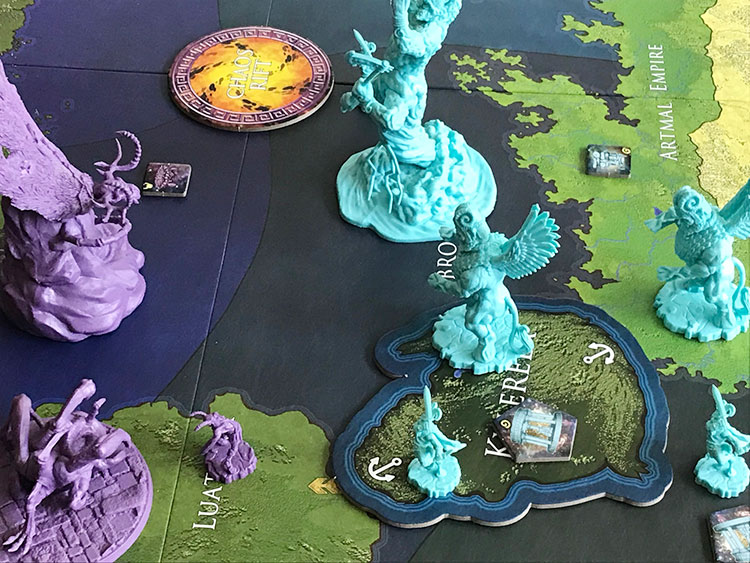
Game Experience:
I was skeptical about liking The Gods War, but I had a blast with this one from the start. Being that it uses similar mechanics to Cthulhu Wars, we got this one to the table fast and the different mechanics are easy to pick-up. The Gods War’s Empires are all asymmetrical and all play differently (especially Chaos), which is a huge replay plus to me. When you try one Empire, you either want to play it again and try a different strategy or approach for the next game, or try a different Empire to see how different it feels. This is what I love most asymmetrical games and The Gods War is no different.
The other big plus for me are the different map elements in The Gods War. The Surface World and the Spike/Chaos Rift tiles are cool because the map is fixed but these elements will change the game and players will need to react to these changes. Also, you have the floating island of Kylerela which players can move when they spend power. This is a great way to move Units at a reduced cost or foil your opponents. The best map features for me were the Sky Dome and Hell side boards. These add another dimension to the game that you don’t have in Cthulhu Wars and plus, if your Units move into Hell, you need to have permission to leave which takes some planning by players to pull off.
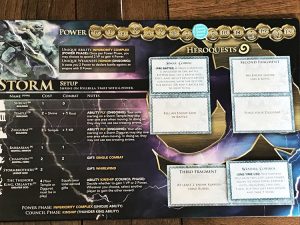
My favorite new mechanic in The Gods War is the Council Phase. I absolutely loved that each round could bring something new depending on the VP count for the lead Empire. At the start, the Council Phase has does not much going on but determining first player and VP. But when 10 VP is reached and the Spike Shatters, the Chaos Rift Struggle gets into full swing and things get interesting. You do secretly decide how much power, but if the Rift doesn’t close there’s a surprising level of negotiation and discussion after—especially when the Chaos Empire is involved. And when 20 VP is reached, the negotiation and discussion gets more intense as players try to form or break alliances, or catch-up or pull-away on the victory track.
One big negative that is if the Chaos Empire is not in play, then the Chaos Rift Struggle is lacking any negotiation and discussion. It’s not much of a “struggle” at that point—you’d be hard-pressed not to close it within 1 turn. The solution is easy when you’re using the Core set: try to always include the Chaos Empire or know that without them the Chaos Rift Struggle will be lackluster. As expansions are added, it’s more likely the Chaos Empire won’t get to the table so just be aware.
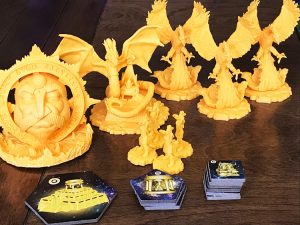
The last big plus is like Cthulhu Wars, the production values of The Gods War are amazing and epic in size. Most of the Greater God minis stand close to 10-12 inches tall and are works of art with incredible detail. All the minis with The Gods War are excellent and even though the base game comes with cardboard punch outs for the buildings – Petersen Games has upgraded sculptures for these shown in the rule book. The map, side boards, runes, Empire boards, and rulebook all are excellently produced pieces full of art and imagery.
The last thing to note, and it’s the only other negative, is that The Gods War is a total table hog. The Map itself, Sky Dome and Hell side boards, are going to take up a huge amount of space. These are going to fill tables and most players will probably need some side tables for their Empires and such. Break out your extra table leaves or just play this one on the floor.
Final Thoughts:
If you love area control games that focus on war and use asymmetrical factions, then Glorantha: The Gods War will be a perfect fit. The unique map elements and the Council Phase bring a welcomed amount of negotiation and discussion that you will not find in games like Cthulhu Wars. Is Glorantha: The Gods War better than Cthulhu Wars? It has elements that I wish Cthulhu Wars did or did better but I’m going to call it a draw. (I know total cop-out answer.)
Unfortunately, if you’re not using the Chaos Empire then the Chaos Rift Struggle in the Council Phase is not going to live up to its potential fun. And be sure to find the largest table surface you have (and break out any table leaves you have) or just clean your floor because Glorantha: The Gods War needs a lot of real estate for set-up and play.
Final Score: 4.5 Stars – An excellent asymmetrical, area control, war game with amazing production values.
 Hits:
Hits:
• Asymmetrical Empires
• Map elements
• Council Phase
• Production Values
Misses:
• Need the Chaos Empire to maximize the Chaos Rift Struggle
• Table hog
Disclosure: An employee for Petersen Games also writes for Board Game Quest. He had no influence over the opinions expressed in this review.








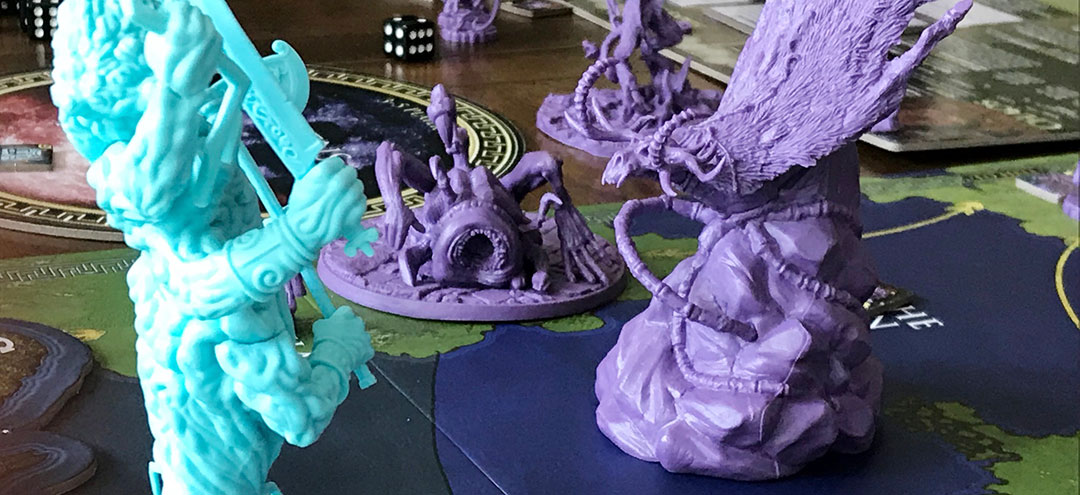

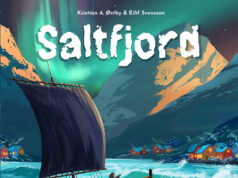
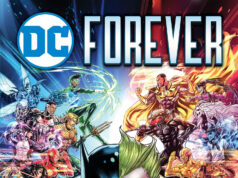












This looks fun. I’ve played a friend’s copy of Cthulhu Wars and enjoyed the slightly chaotic play that dice rolls and variable powers brings – just put the euro-loving brain to sleep for a bit. The one thing I thought was overdone was the size of the miniatures and it looks the same here. Having them so large seems to diminish(IMO) the feel of the map and detracts from the are control aspect.
If there was a version with monster meeples, I’d find this more tempting than with the large plastic figures. That said, friend has done a great job painting his Cthulhu Wars figures and they look fantastic.